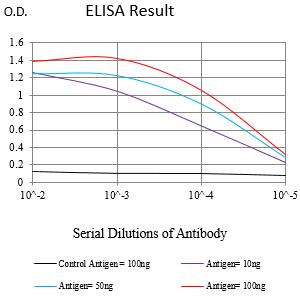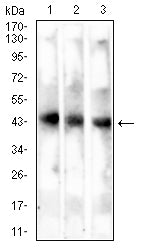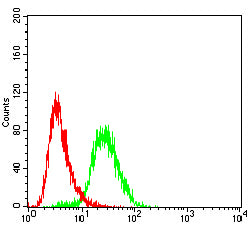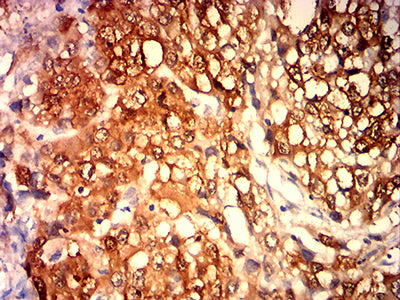



| WB | 1/500 - 1/2000 | Human,Mouse,Rat |
| IF | 咨询技术 | Human,Mouse,Rat |
| IHC | 1/200 - 1/1000 | Human,Mouse,Rat |
| ICC | 技术咨询 | Human,Mouse,Rat |
| FCM | 1/200 - 1/400 | Human,Mouse,Rat |
| Elisa | 1/10000 | Human,Mouse,Rat |
| Aliases | CT1.4; MAGE4; MAGE4A; MAGE4B; MAGE-41; MAGE-X2 |
| Entrez GeneID | 4103 |
| clone | 2B9B4 |
| WB Predicted band size | 34.8kDa |
| Host/Isotype | Mouse IgG1 |
| Antibody Type | Primary antibody |
| Storage | Store at 4°C short term. Aliquot and store at -20°C long term. Avoid freeze/thaw cycles. |
| Species Reactivity | Human, Mouse, Rat |
| Immunogen | Purified recombinant fragment of human MAGEA4 (AA: 1-225) expressed in E. Coli. |
| Formulation | Purified antibody in PBS with 0.05% sodium azide |
+ +
以下是基于现有知识整理的关于MAGEA4抗体的示例性参考文献(建议通过PubMed或Google Scholar获取最新原文):
---
1. **标题**:*MAGEA4 Expression in Human Cancers: Implications for Immunotherapy*
**作者**:Sahin U, et al.
**摘要**:研究分析了MAGEA4在多种实体瘤(如黑色素瘤、肺癌)中的异常表达,验证其作为肿瘤特异性抗原的潜力,并探讨针对MAGEA4的抗体在T细胞免疫治疗中的应用前景。
2. **标题**:*Development of a Novel Monoclonal Antibody Targeting MAGEA4 for Diagnostic Applications*
**作者**:Sigal-Zafra T, et al.
**摘要**:报道了一种高特异性抗MAGEA4单克隆抗体的开发,通过免疫组化证实其在肿瘤组织中的高灵敏度和特异性,支持其作为癌症病理诊断的生物标志物。
3. **标题**:*CAR-T Cells Engineered with MAGEA4-Specific Antibodies Exhibit Antitumor Activity*
**作者**:Dhodapkar KM, et al.
**摘要**:研究利用MAGEA4抗体构建CAR-T细胞,在体外和小鼠模型中显示出对MAGEA4阳性肿瘤细胞的选择性杀伤,为实体瘤的细胞治疗提供实验依据。
4. **标题**:*Prognostic Value of MAGEA4 Antibody Seropositivity in Esophageal Squamous Cell Carcinoma*
**作者**:Takahashi N, et al.
**摘要**:通过血清学分析发现,MAGEA4抗体阳性与食管癌患者的总生存期延长相关,提示其可能作为预后评估的潜在指标。
---
**注意**:以上文献为示例,实际研究请以数据库检索结果为准。建议使用关键词“MAGEA4 antibody”、“MAGEA4 immunotherapy”或结合特定应用场景(如诊断/治疗)进行文献筛选。
The MAGE-A4 antibody targets the melanoma-associated antigen A4 (MAGEA4), a member of the MAGE family of cancer-testis antigens (CTAs). MAGEA4 is normally expressed in immune-privileged sites like the testis and placenta but is epigenetically silenced in most somatic tissues. However, it is aberrantly re-expressed in various cancers, including melanoma, lung, ovarian, and hepatocellular carcinomas, making it a potential biomarker and therapeutic target. MAGEA4 plays roles in tumorigenesis by promoting cell proliferation, inhibiting apoptosis, and modulating transcriptional regulation through interactions with chromatin-remodeling complexes. Its restricted expression in normal tissues and frequent overexpression in malignancies have driven interest in MAGEA4 as a target for immunotherapy, such as cancer vaccines, T-cell therapies, or antibody-based approaches.
Antibodies against MAGEA4 are primarily used in research and diagnostics to detect protein expression via techniques like immunohistochemistry (IHC), Western blotting, or flow cytometry. Clinically, MAGEA4 expression levels may correlate with tumor aggressiveness, prognosis, or response to therapies. However, challenges remain, including understanding its precise biological functions and ensuring antibody specificity due to homology with other MAGE family proteins. Ongoing studies aim to validate MAGEA4's therapeutic potential and optimize antibody tools for both basic research and clinical applications.
×